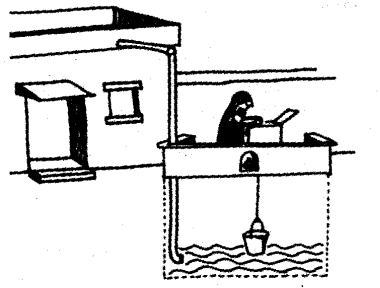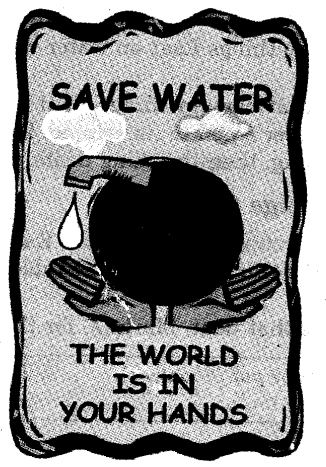NCERT Solutions for Class 5 EVS Chapter 6 Every Drop Counts
QUESTIONS FROM TEXTBOOK SOLVED
Think and Find Out
1.Look at the area around your school. Are there any fields, farms, pucca roads, drains, etc. Is the area sloping, rocky or flat? Think, what will happen here when it rains? Where will the rain water go-into the drains, pipes or pits? Is some water also getting soaked into the soil?
Ans. Yes, there are fields, pucca roads and drains near my school. The area is somewhat sloping. When it rains, the rainwater easily goes into the drain and then to the nearby pond.
2.How do you think the rainwater that falls on the roof will reach the underground tank? Draw the path.
Ans. The water from the roofs goes to the pipes.
These pipes carry the water to the underground tank.
3.Have you ever faced a shortage of water in your area? If yes, then what was the reason for it?
Ans. Yes, we do face shortage of water in my area. This usually happens because of erratic supply from the Jal Board.Talk to your grandmother or any elderly person. Find out, when they were of your age.
4.From where did they get water for the house? Has there been a change now?
Ans. They used to get water from nearby rivers, ponds, wells, bavdis or hand pumps. The situation has changed now. We get water through pipelines of the ‘Jal Board’.
5.What kind of water arrangements were made for travellers—for example piau, mashak (leather bag) or any other? Now what do people do about water when they travel?
Ans. Earlier, kings and rich merchants used to build piau for travellers. Drinking water was served for free at these piaus. Mashak was used for carrying water. Nowadays, people carry bottled water when they travel.
Find Out
1.Is there a lake, well or stepwell near your house or school? Visit it and find out more about it.
How old is it? Who got it built?
Ans. Yes, there is a big pond near my house. People say that it is more than hundred years old. The king of the Raj period built it.
2.What kind of buildings Eire around it?
Ans. There are some ruins of the old palace and some new houses around it.
3.Is the water clean? Is it cleaned regularly?
Ans. The water is very dirty. I have never seen the pond being cleaned.
4.Who all use the water?
Ans. Some washer men use the water to wash clothes. Additionally, some cattle herders bring their cattle for a bath.
5.Is there any festival celebrated at this place?
Ans. Yes, an annual boating festival is celebrated in this pond.
6.Is there any water today or is it dry?
Ans. The pond is full of water.
Discuss
There are two old wells in the area where Punita lives. Her grandmother says that about fifteen-twenty years ago there was water in these wells. The wells could have dried up because:
• Water is being pumped up from under the ground, with the help of electric motors.
• The lakes in which rain water used to collect are no longer there.
• The soil around trees and parks is now covered with cement.
1.Is there some other reason for this? Explain. .
Ans. Apart from the reasons given above, there can be some other reasons also. Almost all the trees have been cut. The well is not being maintained.
The Story Today
1.Let us see the different ways in which the people manage water today. See the picture and discuss. Do you get water hat. If you get win your house by any of these ways?
Put a tick (right) on tater by some other way, write in your notebook.
• We get water from the Jal Board. We have connected a motor with the supply line. This helps us in storing water in the rooftop tank.
• The slum area near my house gets water from a Jal Board tanker which comes once in a day.
• In my grandfather’s village there are some hand pumps which draw underground water.
• I have seen some ladies in the village bringing water from the nearby canal.
Discuss
1.Everyone has the right to live. Yet, is everybody getting enough water to live or even water to drink? Why is it that some people have to buy drinking water? Should it be like this? Water on this earth is for one and all. Some people draw out water from the ground by deep borewells. How far is it correct? Have you ever seen this? Why do some people put a pump directly in the Jal Board pipe line? What problems would other people face due to this? Do you have any such experience?
Ans. It is a harsh fact that everybody is not getting enough water to even drink. Drinking water is scarce and hence some people have to buy drinking water. It should not be like this. Drawing water by deep borewells is not a correct practice. I have seen many rich people, installing deep bore wells. Some people also directly put a pump in the Jal Board pipe line. Due to this, other people do not get sufficient water. In most of the houses in my colony, people have put pump directly into the Jal Board pipe line.
Look at this Bill and Tell
1.From which office has this bill come?
Ans. The bill has come from Delhi Jed Board.
2.Do you get a water bill at home? Find out from where it is sent.
Ans. Yes, we get a water bill at home. The bill comes from the Department of Water Supply.
3.Why do you think Dilli Sarkar (Government of Delhi) is written under Delhi Jal Board?
Ans. Delhi Jal Board is a part of the Government of Delhi. That is why Dilli Sarkar (Government of Delhi) is written under Delhi Jal Board.
4.In whose name is the bill? How much money do they have to pay for each month?
Ans. The bill bears the name of Sri Mohd. Umar and Dr. Mohd. Shoaib. The bill amounts to Rs 350 for two months and hence they have to pay Rs 175 for each month.
5.Do you have to pay for water? How much? Is the rate of water different in different colonies? Ask you elders.
Ans. Yes, we have to pay for water. We pay about a thousand rupee for drinking water. The rate of water is same in different colonies.
6.Have you ever read this kind of news in any newspaper? How did people solve their problem of water? Did they repair and reuse any old lake or stepwell?
Ans. Yes, I have read this kind of news in the Times of India. There was news of a village from Maharashtra. People formed a group to make provisions for collecting rainwater in huge ponds. An old pond was cleaned of debris and was made deeper. People also planted trees around the village. This helped them to solve their water problems.
What We Have Learnt
1.Make a poster. Do you remember the slogan “Water on earth is for one and all”. Think of some other such slogans. Draw pictures and make a nice poster.
Ans.
2.Bring a water bill, look at it and tell—
• This bill is from- date to date-.
Ans. The duration of the bill is from 10th December 2011 to 5th February 2012.
3.How much money is to be paid for this bill?
Ans.Rs.350.
4.What else can you see in the bill, like the money spent on repair, maintenance, etc.?
Ans. Yes, Rs.35 have been charged for repair.










